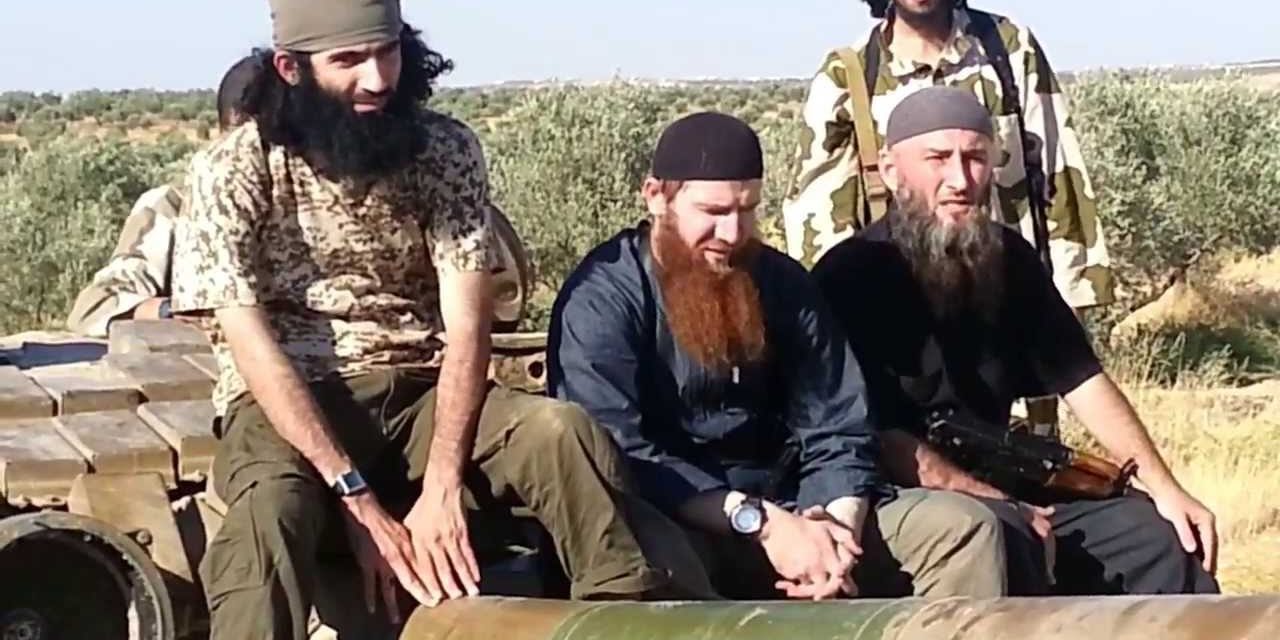What is the relationship between Chechen jihadists and the Islamic State of Iraq and Ash Sham.
A video message posted earlier this week of jihadi leader Abu Umar Al Shishani, a “Kistinian” or ethnic Chechen from Georgia, sheds light on that question. It highlights his roles in two Islamist factions in Syria — the Jaish Muhajireen wal Ansar and ISIS — and on tensions between the two groups.
The pro-Jihad, Russian-language site FiSyria.com, which published the video of Abu Umar, said the footage was made following a meeting in Idlib between the Emirs of the Mujahideen of the Islamic State of Iraq Ash Sham (ISIS).
At the meeting, the Emirs discussed issues of military tactics and Jihad strategy. FiSyria said that at the Idlib meeting, the Emirs also planned additional military operations throughout the territory of the “Islamic State of Iraq and Ash Sham [Syria]”.
Before returning to Aleppo, Abu Omar sent a brief video message from atop a tank in Idlib, reporting on the progress of the Mujahideen in the north of Syria and laying out a plan for future military operations.
The pro-Jihadi website Kavkaz Center, which is run out of the Caucasus, adds further detail. It names Abu Umar as both the Emir of ISIS’s northern forces and the leader of a separate group of foreign, mainly-Chechen fighters, Jaish Muhajireen wal Ansar (“Army of Emigrants and Helpers”).
Kavkaz Center says that Jaish is made up of units with fighters from the “Caucasus Emirate” [Chechnya and the Caucasus region], Ukraine, Crimea, Russia, and Europe as well as Arab and Asian countries. In addition to Jaish’s involvement in Aleppo, the group is fighting battles in other areas, such as Hama and Latakia Provinces..
Some Mujahideen from the “Caucasus Emirate” are also deployed in Hama and Latakia Province, according to Kavkaz Center.
As EA has noted, Abu Umar has cooperated with ISIS — and here he is trusted to lead operations in northern Syria — but so far the Jaish al-Muhajireen wal-Ansar have not formally sworn allegiance to the Iraqi-led faction.
Indeed, tensions in the relationship with ISIS have led to divisions and splits iJaish al-Muhajireen wal-Ansar.
Abu Umar’s video message comes after his former second-in-command, the Chechen fighter Seyfullakh, split from Jaish and formed a new group, Mujahideen of the Caucasus and Syria (Mujahideen Kavkaz wa Ash-Sham).
Trying to re-establish his authority, Abu Umar, who speaks in heavily-accented Russian, repeats several times that he and other foreign fighters have come to Syria to wage Jihad. He declares that the fighters have had many successes, “As you can see, we are sitting on this tank and we have many modern weapons.”
Abu Umar then hands over to another Russian-speaking insurgent on the tank, who greets Jihadists in Syria and all those who are not able to join them:
I want to remind [you] that this endeavor, this jihad, is not a personal endeavor, it is an endeavor of the Ummah [Muslim community], it is a question of the Ummah. And therefore, nobody has the right today to sit doing nothing, with folded arms. Everyone must do the work that is within his power… if you can’t help physically, then help with words, if you can’t help with words, then help with property.
The fighter than talks about the successes of the group, and repeats that the fighters will continue to strive for more successes, because this is “all for the Ummah”.
“The Jihad will continue,” he say, calling on others to do their part.
The fighter urges unity, saying that talk of “eternal schisms and dissolutions” have no influence over Jihad. When everyone stands together, he says, then no force can defeat them.
Today, he adds, the enemies of Allah and religion have united together despite their differences, and in spite of their hatred for each other, their different languages, and different skin colors.
“They have all united together against us, against our goal. So how can we, Muslims, slaves of Allah, Mujahideen, not unite for our common goal?” he says.
The fighter calls on Muslims — whether in Syria or anywhere else, to unite and not to listen to detractors.
“Everyone must act as he is able,” he says.

